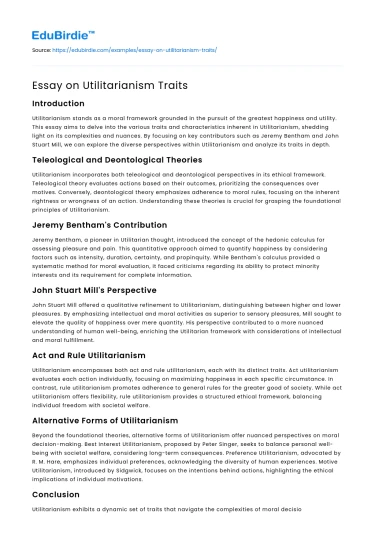Introduction
Utilitarianism stands as a moral framework grounded in the pursuit of the greatest happiness and utility. This essay aims to delve into the various traits and characteristics inherent in Utilitarianism, shedding light on its complexities and nuances. By focusing on key contributors such as Jeremy Bentham and John Stuart Mill, we can explore the diverse perspectives within Utilitarianism and analyze its traits in depth.
Teleological and Deontological Theories
Utilitarianism incorporates both teleological and deontological perspectives in its ethical framework. Teleological theory evaluates actions based on their outcomes, prioritizing the consequences over motives. Conversely, deontological theory emphasizes adherence to moral rules, focusing on the inherent rightness or wrongness of an action. Understanding these theories is crucial for grasping the foundational principles of Utilitarianism.
Jeremy Bentham's Contribution
Jeremy Bentham, a pioneer in Utilitarian thought, introduced the concept of the hedonic calculus for assessing pleasure and pain. This quantitative approach aimed to quantify happiness by considering factors such as intensity, duration, certainty, and propinquity. While Bentham's calculus provided a systematic method for moral evaluation, it faced criticisms regarding its ability to protect minority interests and its requirement for complete information.
John Stuart Mill's Perspective
John Stuart Mill offered a qualitative refinement to Utilitarianism, distinguishing between higher and lower pleasures. By emphasizing intellectual and moral activities as superior to sensory pleasures, Mill sought to elevate the quality of happiness over mere quantity. His perspective contributed to a more nuanced understanding of human well-being, enriching the Utilitarian framework with considerations of intellectual and moral fulfillment.
Act and Rule Utilitarianism
Utilitarianism encompasses both act and rule utilitarianism, each with its distinct traits. Act utilitarianism evaluates each action individually, focusing on maximizing happiness in each specific circumstance. In contrast, rule utilitarianism promotes adherence to general rules for the greater good of society. While act utilitarianism offers flexibility, rule utilitarianism provides a structured ethical framework, balancing individual freedom with societal welfare.
Alternative Forms of Utilitarianism
Beyond the foundational theories, alternative forms of Utilitarianism offer nuanced perspectives on moral decision-making. Best Interest Utilitarianism, proposed by Peter Singer, seeks to balance personal well-being with societal welfare, considering long-term consequences. Preference Utilitarianism, advocated by R. M. Hare, emphasizes individual preferences, acknowledging the diversity of human experiences. Motive Utilitarianism, introduced by Sidgwick, focuses on the intentions behind actions, highlighting the ethical implications of individual motivations.
Conclusion
Utilitarianism exhibits a dynamic set of traits that navigate the complexities of moral decision-making. From the foundational contributions of Bentham and Mill to the alternative perspectives proposed by Singer, Hare, and Sidgwick, Utilitarianism continues to evolve and adapt to contemporary ethical considerations. By analyzing its traits in depth, we gain insight into Utilitarianism's enduring relevance and its capacity to address the diverse challenges of ethical discourse.






 Stuck on your essay?
Stuck on your essay?

